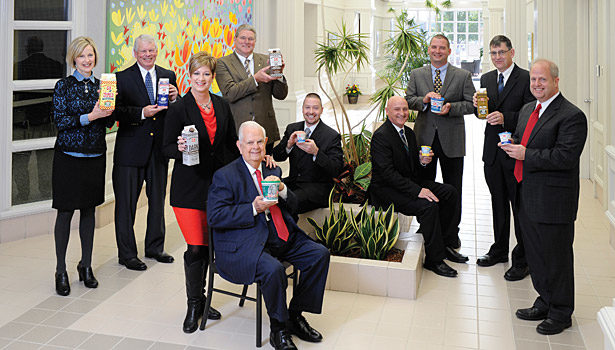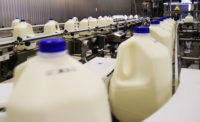Milk is milk, right? Not exactly. Beyond the “four fats” (whole, 2%, 1% and nonfat), there are flavored milks and value-added milks.
No two fluid milk processors are alike, either. Creameries take different approaches to the sourcing, processing and marketing of milk.
As part of our National Dairy Month celebration, we are highlighting four milk processors we’ve previously profiled at Dairy Foods and each company’s unique approaches to handling fluid milk.
As the milk industry continues to face its challenges, these processors have found ways to rise above and face these challenges head on, following their own unique paths.
Snowville Creamery sells minimally processed grass-milk
Snowville Creamery is a locally owned small business, located in Pomeroy, Ohio, 115 miles southeast of Columbus. Its owner is Warren Taylor, a man who speaks his mind, has strong opinions and is a self-proclaimed “dairy evangelist” and “dairy revolutionary” who says, “God didn’t make milk wrong.”
The company makes minimally process foods and the creamery sources milk from cows not treated with rBST, the artificial growth hormone. The cows don’t eat genetically modified grains. Instead, they graze on grass and clover. The company's milk is bottled and can be on store shelves within two days. Read more about how Snowville Creamer is making its unique mark here.
Crystal Creamery has a two-pronged milk marketing strategy
Crystal Creamery of Modesto, Calif., is the No. 1 brand of conventionall milk in Sacramento. The company also owns organic dairy Humbolt Creamery. According to CEO Frank Otis, managing two brands can be ‘tricky.’ Read more about this company's two-brand strategy here.
Humboldt’s marketing is geared toward the consumer who cares about the quality of the milk that they drink. “They just need it to be clean, simple, delicious and organic,” says a marketing consultant. “This brand is sort of like this encapsulation of what consumers are looking for."
Plant of the Year Kroger invests in state-of-the-art processing systems
The Kroger Co. had lofty ambitions when it set out to build its first new fluid milk plant in more than 20 years. According to Erin S. Sharp, Kroger’s group vice president for manufacturing, the company wanted to build a plant that would set the company apart from other dairies in the United States.
The Cincinnati, Ohio-based grocery chain got its wish with the Mountain View Foods plant in Denver that opened Memorial Day weekend 2014. The facility processes fresh conventional and organic milk in half-gallons and gallons and it packages aseptically processed milk, creams and juices in quarts and smaller bottles. The plant currently supplies milk to about 150 King Soopers and City Market stores (chains owned by Kroger). Read more here about how Kroger's best practices keep the milk fresh longer.
With a focus on freshness, family-owned AE Dairy thrives
Anderson Erickson, known as AE Dairy, Des Moines, Iowa, is a customer-driven business. It has outlasted all the other dairies (surviving nearly 85 years) that once supplied Des Moines, thanks to its single-minded focus on the consumer. The third-generation family-owned business has a brand position expressed as “Ridiculously High Standards.” The standards focus on both customers and consumers, as well as the foods and beverages themselves.
From its one plant in Des Moines, Anderson Erickson Dairy supplies Iowa and some neighboring states with milk and Grade A foods including cottage cheese, yogurt (conventional and Greek) and sour cream. It sources its milk from local farmers. Besides making its own branded products, the dairy co-packs for other customers. Read more about this dairy company's unique path here.






